Personal styling isn't just about picking the right clothes; it's about understanding how certain design elements can enhance or conceal various body shapes. As an expert in this field with 20 years experience, I've witnessed how strategic choices, particularly with regards to rushing and draping, can significantly impact one's appearance.Let's delve into the intricate details of how these design techniques influence our outfits and overall look, and how you can use them to your advantage.
Here's a question I recently received from a reader: I want to ask about the effects of rushing and Gathering and draping are they curved lines and do they add volume and curves to our body why do you recommend ring Gathering and draping to hide a big belly how can those details make a tummy area appear smaller what are the difference between those details?
Effects of Curved Lines and Volume Addition
When it comes to dressing strategically, understanding the effects of curved lines and volume addition is crucial. Curved lines, such as those created by rushing and gathering, can play a pivotal role in either accentuating or concealing specific body features.
Imagine this - you slip into a dress that looks amazing on the hanger in the store, but the fabric stubbornly highlights every contour, leaving you feeling self-conscious. This is where the power of ruching and gathering comes into play. Picture those delicate folds that lend a touch of elegance while cleverly diverting attention from those natural curves and folds of the body. By strategically placing these details, we can create a visual illusion that slims down the appearance of that troublesome tummy. How? Well, let me unravel the mystery.
If you've ever wondered how rushing can effectively hide a protruding belly, the answer lies in their ability to create optical illusions. By incorporating this design technique, you can divert attention away from certain areas, creating a more balanced and flattering silhouette.
The Art of Camouflaging:
When we opt for a fabric that smoothly hugs the body, it tends to magnify any natural bulges or folds, giving the impression of a larger figure. However, with the addition of subtle ruching or gathering, the eye gets pleasantly distracted, effortlessly concealing those 'trouble spots'. This diversionary tactic essentially grants your body some breathing space, avoiding the constriction of fabric that can amplify the appearance of certain areas.
Differentiating Between Ruching and Gathering
Ruching involves the addition of small folds in the fabric that run on both sides of the body, strategically placed to distract the eye from natural body curves. Because the amount of fabric is limited and the gathers don't open, it creates a textured surface on the fabric which fools the eye into not seeing any underlying lumps or bumps. By understanding how to utilize ruching, you can create a more visually appealing ensemble that suits your body type.
Ruching is a form of gathering, but gathers, which you will often find at waistlines and necklines, fall open and tend to make an area appear larger (as the fabric spreads over the area).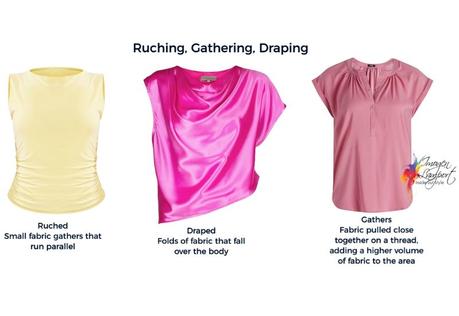
Curves and Volume
Now, let's talk about the impact of curves. While they can undoubtedly add volume to your frame, they hold the potential to be a double-edged sword. For instance, a delicately gathered neckline cascading over a generous bust might accentuate its size, but gathering over a small bust will enhance its curves. This is why it all comes down to how we employ these curves strategically. The more fabric in the gather or drape, when not held down onto the fabric and allowed to spread, the larger that area can appear as the volume of fabric expands over the area.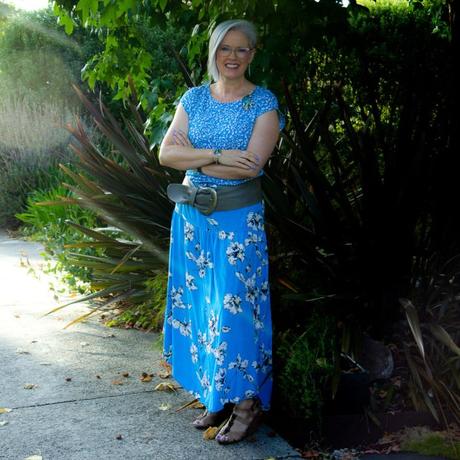
This skirt is gathered at the hip, but as there is only a small volume of fabric in the gathers it doesn't have a really widening effect. The volume of additional fabric makes a big difference in how it ends up looking on you.
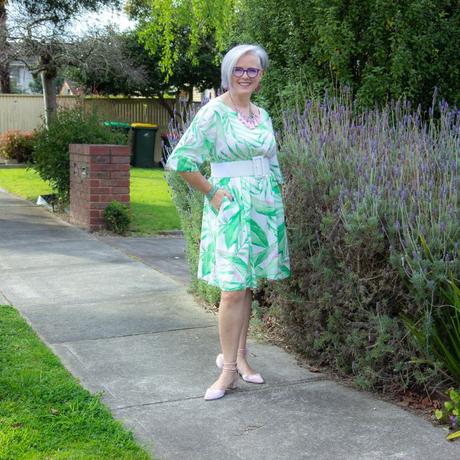
Here's an example of a dress with a gathered waistline (I made it as an experiment) and because there is too much fabric in the gathers, even though they hang as horizontal lines under my tummy, they spread out and add additional bulk, which is not the look I was hoping for!
Horizontal lines, which are usually deemed less flattering, can surprise us when skillfully utilized. When placed close together, they cease to widen and, instead, create a vertical illusion, elongating the body and offering a slimming effect and that textural effect of the ruching hides your tummy. Narrow lines, no matter the direction are slimming, whilst wide lines, no matter the direction are broadening. I've discussed this concept here in detail if you want to learn more about it - in the image trade we call it "fences vs ladders". A fence is widening, whilst a ladder is slimming.
The Magic of Draping:
Moving on to draping, a technique that's no less enchanting. Imagine fabric gracefully enveloping your form, accentuating your every movement. Draping, unlike gathering, involves artfully manipulating the fabric, creating elegant folds that add a touch of sophistication. Whether it's that diagonally draped blouse or a softly cascading dress, the magic lies in the way it embraces your body, lending an air of effortless grace. Understanding the drape of the fabric is key here; opting for softer, drapey fabrics can work wonders in concealing those trouble areas, whereas stiffer fabrics might stand out, drawing attention to areas you'd prefer to downplay.
Here is an example of a top with draping in a very soft fabric. Notice how it skims over and hides curves.
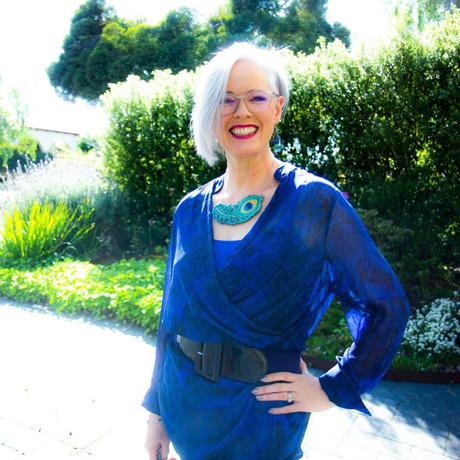
The choice of fabric drape and texture can significantly influence how an outfit sits on your body. Opting for softer, more flowy fabrics can help create a graceful and flattering look that complements your natural curves.
Conversely, stiffer fabrics can create structured looks, which may not always be favorable, especially when trying to disguise certain body areas. Stiff fabrics stand away from the body rather than folding in on themselves which reduces their bulk. Understanding the impact of fabric stiffness on your overall appearance is key to making informed clothing choices.
Embrace the Art of Illusion:
In the world of fashion, it's not just about the clothes; it's about the art of illusion. I frequently talk about becoming a magician with clothing (learning that art of optical illusion which you can read about here) as it gives you the power to know exactly which clothes to even bother trying on so you're not wasting your time as you have an understanding of how it will look on, based on the way the garment is constructed. The way we utilize these techniques can be the defining factor in how we present ourselves to the world. Remember, every fold, every curve has the potential to create a symphony of style that resonates with your unique personality. So, the next time you're picking out an outfit, consider the subtle power of fabric manipulation and how it can play a pivotal role in crafting the image you desire.
I hope you can now carry this newfound knowledge with you, weaving it into your sartorial adventures. Whether it's the gentle ruching that flatters our curves or the graceful drape that adds an ethereal touch, let's embrace the art of dressing with confidence and poise. And hey, if you're eager to explore these concepts further, don't forget to check out my online personal styling programs, including the transformative 7 Steps to Style, where we delve deeper into the enchanting world of fashion and self-expression.
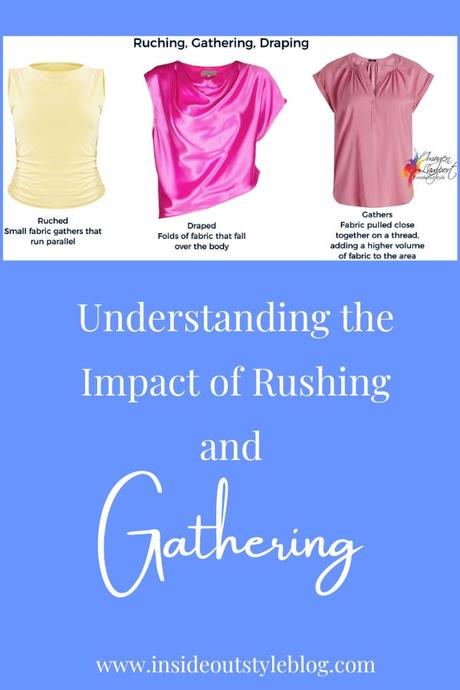
Brilliant Tricks of the Clothing Magician - How to Highlight and Camouflage for Figure Flattery
The Magic of Outfit Focal Points
How to Create Your Own Figure Flattery Guidelines with the Body Equation


